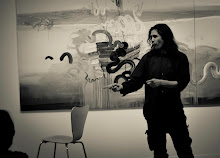One of the features of philosophy, written or performed, is its relationship with its authors. In a sense every written discipline conjures up and then possibly kills its non-present author, in a whole variety of ways.
For example, both drama and novels exist as the progeny of their author. A Shakespeare play or a Dickens' novel is essentially part of a tribe, whose badge is the name and all it implies, of their distant author or parent. Each work reflects their parent's concerns, while being a thing in its own right. Moreover each work is bought into a relationship with all the other works of the same author, good or bad, short or long, comedy or drama. They all jostle together as siblings reflecting and refracting each other's themes, and ideas, but always each doing so in its own way, while others look on and choose their favourite...
Alternatively science, in the name of constants or formulae or laws, treat the name of their founder or first observer almost as an impresario. One talks then of Newton's laws of motion, as if he was the one who had realized their production. Which in a sense of course he was. It was his genius after all that cleared the way, that defined the stage in which the laws function, and through which they might be observed. In a similar vain, Einstein 'arranges' relativity and opens our minds not only to different ways of producing thoughts about the natural word, but also, that in the form of new experiments, endless new little possible dramas. (For experiments can be very dramatic.)
Philosopher's names are again different. For philosophy almost at its outset, used the names of others to explore thought, calling them up as if they were familiar spirits or demons, or wearing them as dramatic masks. Hence Plato called upon the voice, mask, and so ideas of Socrates to explain his thinking, while Kant wrestled with a Hume whose ideas he felt he needed to counter. Philosophers therefore enter the mind as a way of thought, a set of assumptions and moves, or ideas and observations, that are then treated as something in themselves. The power of a philosopher's ideas lies in their power to allow others to don the mask of their thinker, and to use those ideas to create new thoughts of their own. An idea is good in philosophy if it can take over, and run across the minds of very many other thinkers, and infuse many other ideas.
It is this feature of philosophy that works so very well as Stand up. One is always, in different ways, conjuring with another's ideas. To perform philosophy is to show exactly how and why philosophy works as it does. That is, it is to show how thinking with another's ideas actually allows and develops new thought. And even more importantly, stand up hopes to communicate how that curious state that develops in the mind of the student of philosophy, where they are no longer sure where their thoughts begin, and another's end, is so creative and so powerful. It is this 'in between space', where ideas are shared, and developed, held in common, and so transformed, that defines philosophy; but also perhaps ironically, which makes good stand up, which likewise revolves around a collective reacting to an idea or phrase or perhaps experience. It follows that done properly, stand up philosophy ought to be very real philosophy, for the sharing of ideas between the living and the dead and the creation of odd interpersonal thoughts that necessarily follow, is the stuff of philosophy itself, and the source of some of its power. So that essentially, philosophy is performance, it is always the sharing of ideas attached to philosopher-actors, and it is this vitality, this hidden drama, which stand up exploits and feeds upon, and hopes to communicate.


No comments:
Post a Comment